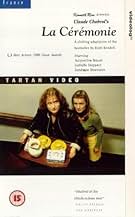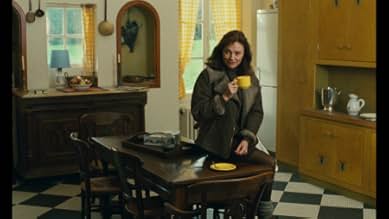VALUTAZIONE IMDb
7,5/10
14.797
LA TUA VALUTAZIONE
Una domestica di una ricca famiglia fa amicizia con un impiegato che la incoraggia a ribellarsi ai suoi datori di lavoro.Una domestica di una ricca famiglia fa amicizia con un impiegato che la incoraggia a ribellarsi ai suoi datori di lavoro.Una domestica di una ricca famiglia fa amicizia con un impiegato che la incoraggia a ribellarsi ai suoi datori di lavoro.
- Regia
- Sceneggiatura
- Star
- Premi
- 9 vittorie e 11 candidature totali
Recensioni in evidenza
The upper-class owner of a gallery Catherine Lelievre (Jacqueline Bisset) hires the efficient and quiet maid Sophie Bonhomme (Sandrine Bonnaire) for working in the family manor in the countryside of France. Her husband Georges Lelievre (Jean-Pierre Cassel), who is an opera lover, her daughter Melinda (Virginie Ledoyen) and her teenage son Gilles (Valentin Merlet) welcome Sophie and appreciate her work. Soon Sophie befriends the postmistress Jeanne (Isabelle Huppert), who is a social outcast, and she encourages Sophie to rebel against her employers, but the maid stays submissive. However, Sophie is ashamed of a secret and feels uncomfortable in many situations, finding a way to hide her secret. When Georges tells to Sophie that he does not want Jeanne in his house, Sophie stands up against him. Melinda discovers her secret and Sophie blackmails her, but Melinda tells her parents what has happened. Georges fires Sophie and she returns to the house later with Jeanne on the rampage with tragic consequences.
"La Cérémonie" is one of the best films by Claude Chabrol and it is still impressive after watching many years after the release. The poignant story of class conflict, alienation and even evilness of two outcast working-class women stays in the mind of the viewer since it might happen to anyone that has a maid at home. The unexpected violent conclusion is probably the source of inspiration for Michael Haneke's "Funny Games" (1997). It is impossible to the viewer to be not affected by the despicable and cruel behavior of the repressed Sophie and the envious Jeanne. My vote is nine.
Title (Brazil): "Mulheres Diabólicas" ("Evil Women")
Note: On 21 April 1999, I saw this film again.
Note On 08 May 2017, I saw this film again.
Note: On 08 January 2025, I saw this film again.
"La Cérémonie" is one of the best films by Claude Chabrol and it is still impressive after watching many years after the release. The poignant story of class conflict, alienation and even evilness of two outcast working-class women stays in the mind of the viewer since it might happen to anyone that has a maid at home. The unexpected violent conclusion is probably the source of inspiration for Michael Haneke's "Funny Games" (1997). It is impossible to the viewer to be not affected by the despicable and cruel behavior of the repressed Sophie and the envious Jeanne. My vote is nine.
Title (Brazil): "Mulheres Diabólicas" ("Evil Women")
Note: On 21 April 1999, I saw this film again.
Note On 08 May 2017, I saw this film again.
Note: On 08 January 2025, I saw this film again.
Claude Chabrol, one of the leading lights of the French New Wave, faded into a series of unimaginative throwaway flicks and obscurity (peppered with moments of worthiness such as Blood Sisters )until storming once again into the limelight with this claustrophobic psycho-thriller adaptation.
Like Heavenly Creatures and Fun this film is anchored around the destructively intense relationship between two female leads: the apparently insipid family housemaid Sophie (Sandra Bonnaire) and the sparky but cumulatively obnoxious postmistress Jeanne (Isabelle Huppert). They both, it transpires, have potentially murderous secrets in their past involving the incineration of unwanted relatives (a child and a father). After a roundabout, deliberately vague "confession" to each other they erupt into childish laughter and it seems their relationship is cemented in their mutual utter lack of remorse.
There is no guilt felt by either woman for any of their crimes be it spite, neglect, theft, opening other's mail, arson or even murder. This is because, primarily though Jeanne's obsessive class angst and Sophie's obsessive paranois, they justify their stance and actions with an "us against them the world" self-righteous fervour. Jeanne describes all her - increasingly erratic - behaviour as "a good deed" and the equaly unstable Sophie believes her.
Every role is acted impeccably by some of the leading lights of French cinema. Along with Bonnaire and Huppert, arguably the best French actresses working today, Jacqueline Bisset plays the bourgeouse lady of the house for whom Jeanne works. She sees herself as a kind and understanding employer, providing glasses and a television for her taciturn domestic. However this gesture is interpreted as patronising by the illiterate Jeanne.
It's through minot details such as this that character exposition arises . The two principals are painted with tiny, finely detailed brushstrokes while everyone around them is painted with broad strokes. This intentional disparity brings us uncomfortably closer to the unhinged worlds of Jeanne and Sophie. Worlds which are revealed slowly, subtly and manipulatively.
La Ceremonie is based of a Ruth Rendell novel, "Judgement in Stone". Rendell is an archetypal British writer and I think that if La Ceremonie was a British film with British actors and a skilful British director it would have been a very different, darker and more disturbing movie. Having said this, Chabrol, with his distinctly French sensibilities and post nouvelle vague expertise brings other qualities to the story and makes this a remarkable film. Chabrol avoided darkness for the sake of it in favour of a highly sophisticated level of characterisation and build-up. The climax, however it was filmed, could never be anything less than shocking.
Ultimately la Ceremonie presents a pessimistic view of humanity: bleak, depressing and disturbing. Even Bisset's family don't come off well with their selfishly consumereist and blinkered middle class lifestyles.This and the high degree of audience manipulation means the film leaves a bad taste in the mouth but there's no denying it's an egregious work of art.
Like Heavenly Creatures and Fun this film is anchored around the destructively intense relationship between two female leads: the apparently insipid family housemaid Sophie (Sandra Bonnaire) and the sparky but cumulatively obnoxious postmistress Jeanne (Isabelle Huppert). They both, it transpires, have potentially murderous secrets in their past involving the incineration of unwanted relatives (a child and a father). After a roundabout, deliberately vague "confession" to each other they erupt into childish laughter and it seems their relationship is cemented in their mutual utter lack of remorse.
There is no guilt felt by either woman for any of their crimes be it spite, neglect, theft, opening other's mail, arson or even murder. This is because, primarily though Jeanne's obsessive class angst and Sophie's obsessive paranois, they justify their stance and actions with an "us against them the world" self-righteous fervour. Jeanne describes all her - increasingly erratic - behaviour as "a good deed" and the equaly unstable Sophie believes her.
Every role is acted impeccably by some of the leading lights of French cinema. Along with Bonnaire and Huppert, arguably the best French actresses working today, Jacqueline Bisset plays the bourgeouse lady of the house for whom Jeanne works. She sees herself as a kind and understanding employer, providing glasses and a television for her taciturn domestic. However this gesture is interpreted as patronising by the illiterate Jeanne.
It's through minot details such as this that character exposition arises . The two principals are painted with tiny, finely detailed brushstrokes while everyone around them is painted with broad strokes. This intentional disparity brings us uncomfortably closer to the unhinged worlds of Jeanne and Sophie. Worlds which are revealed slowly, subtly and manipulatively.
La Ceremonie is based of a Ruth Rendell novel, "Judgement in Stone". Rendell is an archetypal British writer and I think that if La Ceremonie was a British film with British actors and a skilful British director it would have been a very different, darker and more disturbing movie. Having said this, Chabrol, with his distinctly French sensibilities and post nouvelle vague expertise brings other qualities to the story and makes this a remarkable film. Chabrol avoided darkness for the sake of it in favour of a highly sophisticated level of characterisation and build-up. The climax, however it was filmed, could never be anything less than shocking.
Ultimately la Ceremonie presents a pessimistic view of humanity: bleak, depressing and disturbing. Even Bisset's family don't come off well with their selfishly consumereist and blinkered middle class lifestyles.This and the high degree of audience manipulation means the film leaves a bad taste in the mouth but there's no denying it's an egregious work of art.
A rich French family hires a mousy maid who has some peculiar traits. It starts out as a nice character study, with Bonnaire creating a sympathetic figure as a young woman who struggles with her illiteracy but is too ashamed to to let anyone know about it. In the last act, however, the film goes south, turning into a silly thriller. The ending is particularly contrived and ridiculous. Bonnaire is quite good as the maid, as is Bisset (speaking in French) as her kindly employer. In fact the whole cast is fine. Chabrol is regarded as the French Hitchcock, but he lacks the master's skill for building suspense with wit and subtlety.
In this character study of two hateful middle-aged women (not so middle-aged in the movie, however, as in the novel by Ruth Rendell) we are made to fathom the bad that may befall the good.
Claude Chabrol's direction is clean, crisp and uncluttered--which isn't always the case, witness his Madame Bovary (1991), which is a bit too leisurely and L'Enfer (1993) which muddles a whole lot. Maybe it's the editing. Anyway this is more like his quietly brilliant Une affaire de femmes (1988) with a fine script and striking performances by Sandrine Bonnaire and Isabelle Huppert, handsomely supported by Jacqueline Bisset, Jean Pierre Cassel and the very pretty Virginie Ledoyen.
Bonnaire plays Sophie, an intense taciturn woman harboring dark secrets, whom the Leliévres have hired to cook and keep house at their country home. Bisset is Catherine Leliévre and Cassel her husband. They exist in bourgeois heaven avec matrimonial bliss with two teenagers, a family so closely knit and so charmingly together that they watch a two-part production of Mozart's Don Giovanni on TV, just the four of them cosily on the couch.
Well, this sort of unobtainable happiness doesn't sit well with Jeanne (Huppert) who is a lowly postal clerk living alone whose past includes the (accidental?) killing of her four-year-old daughter. Jeanne takes a fancy to the Leliévre's strange new maid with the idea of showing her something besides work. They strike up a fateful friendship that we know is leading to something horrible.
Huppert is as good as I've seen her, which is very good indeed. She is particularly striking here in an uncharacteristic role as a spiteful, working class woman with a heart of vengeance against anybody better off than she is. There is just a touch of sly irony in her performance suggesting that she is having a particularly good time playing the nasty. Bonnaire's stark performance as the unbalanced and humorless, reclusive Sophie will remain etched in your brain. Apart they are like inert, harmless chemicals. Together they catalyze one another and become brazen and explosive.
The story, filled with little foreshadowing of the tragedy to come, gilds the lily of our tristesse by making the Leliévres so very, very nice. We are reminded of the violent hatred by the proletariat toward the privileged classes, in this case acted out by two loonies against an innocent, but representative family, echoing not only the Russian Revolution but even more so the French Revolution, now two hundred years old.
What I am trying to figure out why this is called La Cérémonie. Maybe it is a ceremony of execution.
(Note: Over 500 of my movie reviews are now available in my book "Cut to the Chaise Lounge or I Can't Believe I Swallowed the Remote!" Get it at Amazon!)
Claude Chabrol's direction is clean, crisp and uncluttered--which isn't always the case, witness his Madame Bovary (1991), which is a bit too leisurely and L'Enfer (1993) which muddles a whole lot. Maybe it's the editing. Anyway this is more like his quietly brilliant Une affaire de femmes (1988) with a fine script and striking performances by Sandrine Bonnaire and Isabelle Huppert, handsomely supported by Jacqueline Bisset, Jean Pierre Cassel and the very pretty Virginie Ledoyen.
Bonnaire plays Sophie, an intense taciturn woman harboring dark secrets, whom the Leliévres have hired to cook and keep house at their country home. Bisset is Catherine Leliévre and Cassel her husband. They exist in bourgeois heaven avec matrimonial bliss with two teenagers, a family so closely knit and so charmingly together that they watch a two-part production of Mozart's Don Giovanni on TV, just the four of them cosily on the couch.
Well, this sort of unobtainable happiness doesn't sit well with Jeanne (Huppert) who is a lowly postal clerk living alone whose past includes the (accidental?) killing of her four-year-old daughter. Jeanne takes a fancy to the Leliévre's strange new maid with the idea of showing her something besides work. They strike up a fateful friendship that we know is leading to something horrible.
Huppert is as good as I've seen her, which is very good indeed. She is particularly striking here in an uncharacteristic role as a spiteful, working class woman with a heart of vengeance against anybody better off than she is. There is just a touch of sly irony in her performance suggesting that she is having a particularly good time playing the nasty. Bonnaire's stark performance as the unbalanced and humorless, reclusive Sophie will remain etched in your brain. Apart they are like inert, harmless chemicals. Together they catalyze one another and become brazen and explosive.
The story, filled with little foreshadowing of the tragedy to come, gilds the lily of our tristesse by making the Leliévres so very, very nice. We are reminded of the violent hatred by the proletariat toward the privileged classes, in this case acted out by two loonies against an innocent, but representative family, echoing not only the Russian Revolution but even more so the French Revolution, now two hundred years old.
What I am trying to figure out why this is called La Cérémonie. Maybe it is a ceremony of execution.
(Note: Over 500 of my movie reviews are now available in my book "Cut to the Chaise Lounge or I Can't Believe I Swallowed the Remote!" Get it at Amazon!)
I see this movie for the third time and can't prevent myself to notice the pure Claude Chabrol style in the critic of the rich people, especially in the province. But the ending is very bloody and surprising too. And in the mean time, since my last viewing, I saw PARASITES and I can't also prevent myself to see a thin line between the two features. If you have seen both features, you see what I mean. A pure delight.
Lo sapevi?
- QuizThe author Ruth Rendell has said that Claude Chabrol's version of her novel "A Judgement in Stone" is one of the few film adaptations of her work that she is happy with.
- Citazioni
Georges Lelievre: [referring, respectively, to Sophie the illiterate maid and Jeanne the nosy postal clerk] What a pair: one can't read at all, and the other reads our mail.
- ConnessioniFeatured in Isabelle Huppert: Message personnel (2020)
- Colonne sonoreCello Symphony
Composed by Benjamin Britten
I più visti
Accedi per valutare e creare un elenco di titoli salvati per ottenere consigli personalizzati
Dettagli
- Data di uscita
- Paesi di origine
- Sito ufficiale
- Lingua
- Celebre anche come
- The Ceremony
- Luoghi delle riprese
- Aziende produttrici
- Vedi altri crediti dell’azienda su IMDbPro
Botteghino
- Lordo Stati Uniti e Canada
- 873.196 USD
- Lordo in tutto il mondo
- 873.196 USD
- Tempo di esecuzione
- 1h 51min(111 min)
- Colore
- Mix di suoni
- Proporzioni
- 1.66 : 1
Contribuisci a questa pagina
Suggerisci una modifica o aggiungi i contenuti mancanti

![Guarda Bande-annonce [OV]](https://m.media-amazon.com/images/M/MV5BNzliMDEwMzYtMjg1NS00Mjc1LTkwNDktMzc1MmJkNDJjZDIxXkEyXkFqcGdeQXRyYW5zY29kZS13b3JrZmxvdw@@._V1_QL75_UX500_CR0)
















